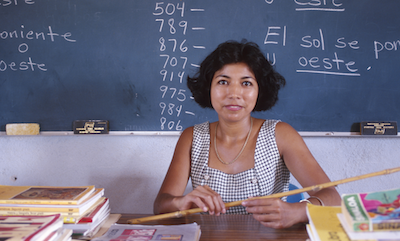Clinical Depression Underdiagnosed in Mexican Female Teachers.
 A significant number of female teachers in Mexico suffer from severe depression, but only a small percentage of them receive formal diagnosis and treatment, according to a new study co-authored by a School of Public Health researcher.
A significant number of female teachers in Mexico suffer from severe depression, but only a small percentage of them receive formal diagnosis and treatment, according to a new study co-authored by a School of Public Health researcher.
The study, published in the Journal of Affective Disorders, found 16 percent of female Mexican teachers suffered from severe depression, but less than 5 percent of those with severe depression had a formal diagnosis. The study also found younger age, unhealthy behaviors, having other health conditions, severe family stress, and living in rural northern or central Mexico were all associated with higher risk of severe depression.
“This is the first large study to advance our understanding in the relationship between individual and regional characteristics and depression among female teachers in Mexico,” says co-author Veronika Wirtz, associate professor of global health. “The large number of teachers with undiagnosed severe depression shows that more resources are needed to address the mental needs in this population. The health of these teachers directly affects their families and communities.”
The researchers used data from the Patient Health Questionnaire (PHQ9) within the Mexican Teacher’s Cohort prospective study, the largest ongoing cohort study in Latin America.
Out of 43,845 Mexican female teachers from 12 states, 7,026 suffered from severe depression based on the PHQ9, but only 1,918 had a formal diagnosis. The researchers found only 17 percent of those with severe depression based on the PHQ9 took psychotropic medication, compared with 60 percent of those with a formal diagnosis.
The researchers identified several factors associated with severe depression, including having other health conditions, getting fewer hours of vigorous physical activity, alcohol consumption, and smoking. Stress related to work, family, and a partner were risk factors, with family stress showing the strongest association with severe depression.
In line with previous research, the study found participants were more likely to have severe depression if they were under 55 years old. However, the researchers found 25-to-34-year-olds were at particularly increased risk of severe depression compared to 35-t0-55-year-olds, warranting further study of the factors affecting younger female teachers in Mexico.
Teachers in rural areas in northern and central Mexican states also showed higher rates of severe depression than those in cities or those living in other parts of the country. “The high level of violence in these two regions, which affect rural areas disproportionately, may help explain this difference,” the authors wrote. “Also, rural areas may have less access to providers properly trained to deal with mental disorders, which increases the chances of transitioning from mild to severe depression because of lack of treatment.”
The authors wrote the dramatic underdiagnosis of severe depression in female teachers in Mexico could be partially because of stigma and of cultural views of depression as an emotional reaction to a situation rather than a disease. The Mexican health system also continues to struggle to provide adequate mental health care, the authors wrote, with a shortage of providers trained in mental health, a lack of appropriate facilities, and obstacles to efficient referral to specialized care.
“The study results could be used to develop a composite risk factor instrument, able to identify female teachers at the highest risk of developing depression,” Wirtz says. “Such a tool could help triage female teachers with these risk factors to offer counseling and treatment options.”
The study’s lead author was alumnus Rene Soria Saucedo (SPH’14) of the University of Florida. The other co-authors were Ruy Lopez Ridaura of the National Institute of Public Health of Mexico (INSP) and Martin Lajous of INSP and the Harvard T.H. Chan School of Public Health.